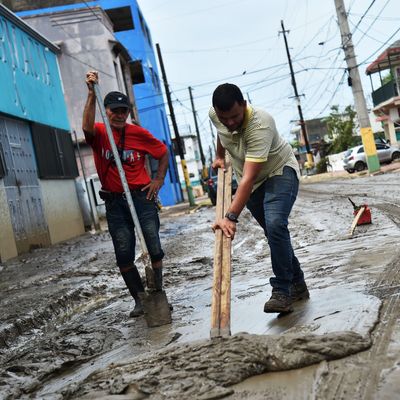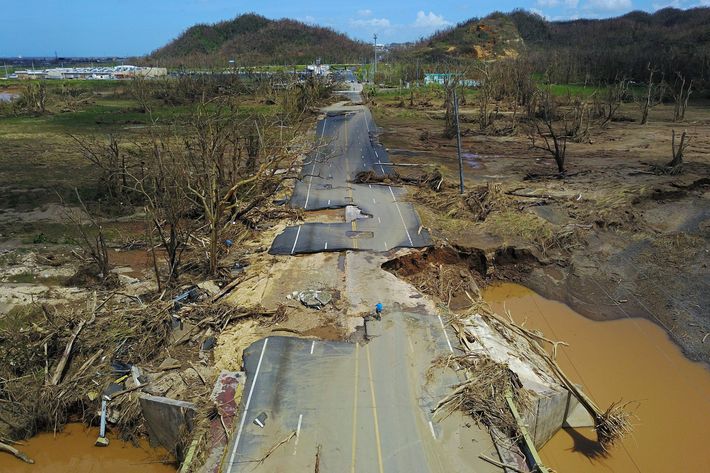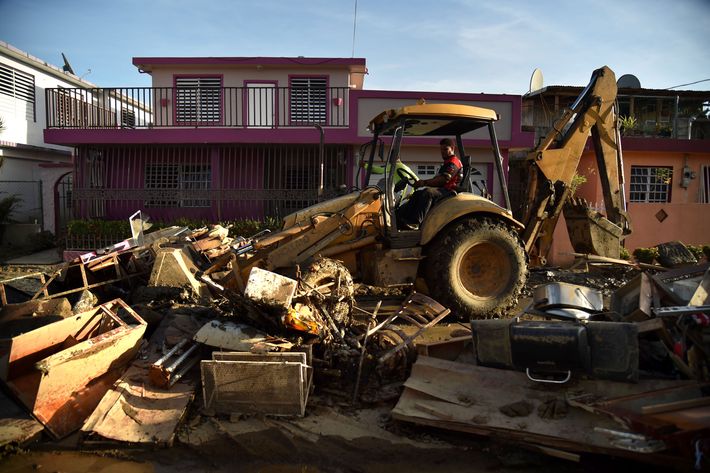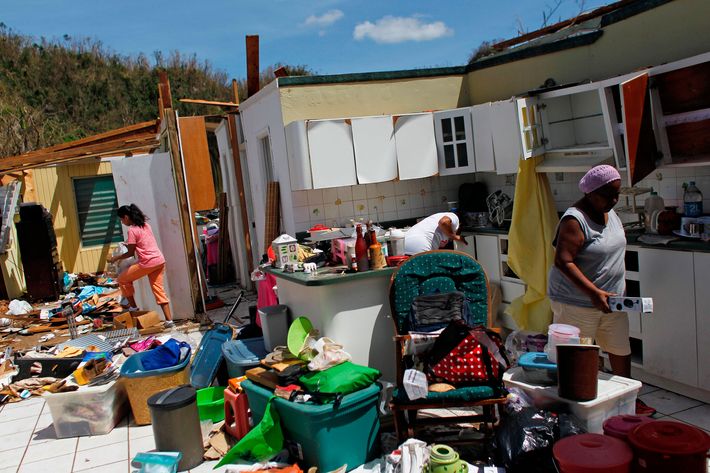
Veronica Ramos, a kindergarten teacher, lives with her son, her partner, and her partner’s mother in hard-hit Toa Baja, a municipality on the island’s northern coast ravaged by floods, including from a nearby reservoir, after government officials opened the gates of La Plata Lake Dam. Hurricane Maria spared her home the worst, though many of her neighbors were not as lucky. Now she worries about supplies and gas and the government’s response. “I can’t believe there are going to be any normal days soon,” she told Daily Intelligencer, via a sometimes spotty phone connection. “We are far from normal.”
The windows were howling like they were going to detach from the walls. We had to mop the second floor because water came in. We lost power at maybe 10 p.m. Tuesday. But we knew that the worst part was still coming. We just heard wind. It sounded like a motorcycle.
Our house was in good shape after the hurricane; we didn’t lose so many things. Outside, some trees were torn out. The fence that we have with another building — it just took out the fence. The palm trees were down. The wires were down. We didn’t have electricity or running water.
But we had to go to sleep because we were really tired; we didn’t sleep well the night before. About ten minutes after I fell asleep, the neighbor called. He was scared because when we got downstairs the water was coming inside of the house. It’s not a place that usually floods — it never floods. There’s people who’ve been living here for about 40 years and they’ve never gotten water that way.
In about one hour, the water was about at my hips in the street. In the house, it got about a foot and a half, two feet depending on the place you were standing. We were scared because we have an elderly person in a wheelchair. We didn’t know what to do, and no one from the municipality, no one notified us that this was going to flood. We didn’t know if they were going to rescue us. The only way out was maybe walking, and we were scared because the water was going up and up. I called 911, but it didn’t function because we lost all communication. We couldn’t communicate with anyone. We just put everything upstairs, everything that we could save.
Our section wasn’t evacuated. There were other places in Toa Baja that were. They were evacuating people in Levittown where the water was really high. It just covered some houses.

But we were lucky. Neighbors, people that I love, they just lost everything. They were taking out their beds. Just — everything.
Now the problem is there’s no gas. Within about two miles from us there are about six gas stations. They’re working one day. Then for two days they don’t. One day they have gas again. You can be in a line for six hours to get gas. One gas station has a store, they were selling things one morning, and then in the past three days they didn’t have anything. It’s empty. There’s nothing you can buy. We’re just living with what we had. The cans, we left them for the next week, so we can have meat.
But it’s a little bit confusing because the government is saying, There is gas. We have plenty. But we can’t see it. We can’t get out of the house in the car because you can’t waste the gas you have. I have to go to the ATM because I don’t have cash and everything is functioning with cash. We have to go and get some cash so we can buy maybe a car generator.
We have to go to the ATM, and I’m a little bit concerned. People are telling stories about robberies. There’s a curfew from 6 p.m. to 6 a.m., and you can’t be in the streets. But things are getting worse with the security. People are taking out the gas from the cars. And there’s no police to deal with the curfew. We can’t see the police. We don’t know where they are.
The first day, the second day after the storm we saw some military, they were going to Ingenio, a neighborhood in Toa Baja that was badly flooded. We haven’t seen them since, maybe in another town that were more damaged. But I can’t say because I haven’t seen them.
The mayor told people on the radio this morning that on Saturday FEMA workers were going to help people in Toa Baja. But he can’t tell where that help will be. Maybe tomorrow — you have to keep listening to the radio to know where. But by the way, we don’t have gas! So it’s like, Okay, come somewhere. How, if I don’t have gas? We can’t go to the gas station every day to see if it’s open. The government says, We’re going to help. This is the way. How can I get there? I can’t get there! I think that the government — Governor Ricardo Rossello — is trying to tell people everything’s okay, but he doesn’t have any clue of how he’s going to respond to everyone.
Radio is working. It was the one signal that was working the next day after the hurricane. Now we have more stations. It’s delivering the messages from the governor. So we can see his perspective — but maybe not the best one. The first thing that we really knew of what happened was through my sister who lives in Jersey. She saw on the internet. We relied on her to tell us.

I think maybe on Monday or Tuesday we received the first cell signal. It’s uncertain. We have it now. We won’t have it in eight hours maybe. I have to charge it with my car. I communicate with my family, then I turn it off so I can save the charge.
We have running water most days. One day yes, the other no. Still, it’s a miracle. A lot of people we know don’t have it, so they come to our house to fill up cans. But there’s another really big problem: the garbage. They haven’t taken it away. Everything is stinky, flies are all over there. Some stores just put out their meat in the trash can and you can see the blood coming out of them. You can see the dead animals. It’s horrible. The mayor from Toa Baja says they’re working with the trash since Monday. But Monday is the day they come to my house to pick up my trash. Today’s Thursday. In other words, they’re going to be late. We’re scared because that’s a health problem that’s coming to us.
I don’t care that much about the electricity coming because we know it’s very hard. But we are concerned about the food supplies. We can’t find supplies. The government wants to get to normality in the workplace, but if we don’t have gas, if we don’t have food, how can we get to normal? Maybe I can deal with it because it’s not that hard for us because we’re in the city, but I think that people in towns that are in the middle of the island are worse off than us.
I’m a kindergarten schoolteacher. Our school is okay, but about 65 refugees who lost everything are living there. Their houses just — they disappeared. I think that we’re going to lose the semester. I don’t know — I can’t see us working in more than a month. I can’t believe there are going to be any normal days soon. We are far from normal.

We are helping each other. The first days were easier to help because we have things. Now, we don’t have too much to share. I think it’s natural for humans to help each other in a catastrophe. It’s romantic to say, Oh, people help each other in Puerto Rico. But I’m sorry, I’m not that romantic. We need help. We need people to work. We need electricity again. We can help each other in the community, okay. But we need the government to work.
Anything that happens in the United States mainland — there’s a fast response. We are second-class citizens. We are, we really are. I can’t tell you anything else, that’s it. That’s the truth. We are a colony, we are not treated equal. We have to beg — to beg the United States to help us when we are part of them. You are a part of us, you have to help us. We are a part of you.
We are abandoned here, waiting here. It’s a problem of the [Puerto Rican] government because it tries to do things, but then they say, Oh, but we have to wait for the government of the United States. We can’t do it alone. We can’t do it alone. But it’s — it’s like weird. Puerto Rico wants to do it by ourselves, but we know we can’t. The government of the United States has to move faster. They have to be here faster, not about a week later. Because we are American citizens. We are not second-class. But we feel it.
This has been edited and condensed for clarity.





























